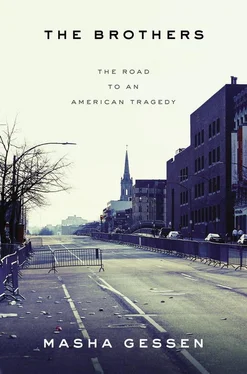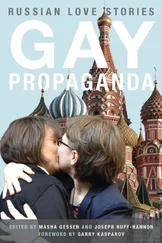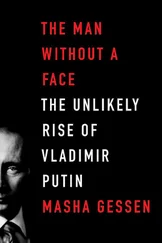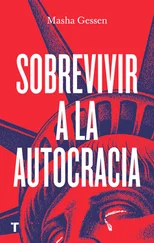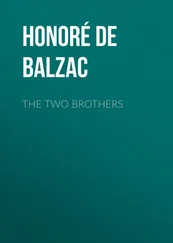Sixty years to the week earlier, a man named Medzhit Baiev said in the presence of a secret-police informant: “I am an old man and don’t need to go anywhere, but my children will now have the same rights as all the other peoples of the Soviet Union. I am deeply grateful to the government.” He was right: his descendant Khassan would grow up in Chechnya. In the 1990s he would face the war there, work as a surgeon operating on the wounded, then escape to the United States and settle in Boston, where he would eventually help another Chechen family, the Tsarnaevs, to settle as well.
But in the 1960s, the Tsarnaevs also stayed in Kyrgyzstan. Zayndy had made it by then—he ran the dumping ground that had formed in an old quarry in Tokmok. Between his official salary and a sideline of collecting scrap metal, paper, and clothing that he fished out of the refuse and turned in to the relevant recycling plants, he was making a good living. His wife was having one child after another. He ran the house like a homegrown tyrant; his wife would stay home and raise their kids to be educated and ambitious, but she would never be seen outside the home. Zayndy would invest in some land in Chechnya and build a house, so that eventually his children’s children would grow up there. This was the thinking of most of those who stayed behind: they were not putting down roots in Kyrgyzstan—they were just extending their stay before their families returned home at last.
In 1985, Anzor Tsarnaev returned from his military service in Novosibirsk to his father’s home in Kyrgyzstan, bringing his young wife with him. The neighborhood was Sakhzavod, so named for the nearby sugarcane-processing plant. There was also a cannery and a wool-processing plant—it was the industrial outskirts of Tokmok, which itself had come to feel like the remote outskirts of Frunze, the capital. Frunze was like a flattened version of Novosibirsk—the same vast squares and broad avenues and Soviet neoclassical buildings, only much lower. And Tokmok was like nothing in particular. The Chu had been harnessed in 1982. It was now a tame little stream flowing through a concrete enclosure, but Tokmok itself still had a makeshift, insecure sense about it, as though every structure could be washed away any minute. With the exception of a couple of school buildings, nothing here looked like it was meant to last.
A conglomeration of settlers had nested their homes near the factories: cinder-block first stories with wooden attics and sharply pitched asbestos-board roofs. One of these roofs had given way under the feet of Anzor’s older brother in 1979 as he was replacing a worn red Soviet flag on top of a trade school with a newer one, and he had fallen to his death. In 1985, when Anzor and Zubeidat came, most of the other five Tsarnaev children were still in or around their parents’ house. The street on which they lived was split about equally between Chechens and ethnic Germans. The latter called their children by Russian diminutives but continued to speak German to them: “Yasha, herkommen,” they called out into the street at suppertime, and the children disappeared behind the cinder-block fences. The street had a blind feel to it—a single block long, lined with solid gray fences, it ran perpendicular to the mountain ranges, so neither of them could be seen from a house window. Immediately upon arriving, Zubeidat commenced dreaming of living by the sea again someday. Everyone on this street dreamed of someday going home to someplace beautiful and far away.
The idea that they were like brother and sister because they were both from the Caucasus really held only as long as Anzor and Zubeidat stayed far away from both the Caucasus itself and their families. According to both Avar and Chechen traditions, now that Anzor and Zubeidat were married, she was to enter his parents’ house as a member of his family. Had she married an Avar, she would have had the support and coaching of the women of her own family in this endeavor; as it was, she was now alone. And to her new family, she was immediately suspect. Neither Anzor nor his parents, who had grown up in Kyrgyzstan with only a mythical, vague story of the Caucasus, had ever even heard of the Avars, although they speak a language closely related to Chechen and have historically been viewed by their Russian rulers as a subset of the Chechens. To the Tokmok Chechens, Zubeidat was just not-Chechen. She worked conscientiously to fit in, quickly and easily learning to speak Chechen—though she and Anzor always spoke Russian to each other—but in other ways she was as different as a woman could be from her new mother-in-law. Liza was what Americans might call a victim of domestic abuse; her Chechen neighbors from Tokmok just say that Zayndy was “very strict” and never let his wife go out in public by herself or, for that matter, with him. Few of their former neighbors can even recall her name, so quiet and invisible was she. Zubeidat and Anzor, on the other hand, appeared inseparable; more than that, they appeared to be equal partners. Not for Zubeidat the Chechen—or Avar—custom of serving the men and never sitting down at the table with them, or with the guests. Nor did she hold back in conversation. She could be charming, she had a loud, unabashed laugh, she invited and accepted compliments, and unlike her gentle husband, she could occasionally be cutting. If anything, these rebellious ways had to do with Zubeidat’s having grown up in a city, and with having made a break with her own family, but Liza had only one word for all of it: Avar.
Anzor had promised Zubeidat back in Novosibirsk that he would take her as far as they needed to go to be happy together. It is not clear how they chose Kalmykia as their destination after Tokmok. Most of Anzor’s uncles and cousins had moved to Chechnya, and Zayndy was, according to his plan, slowly building a house there as well, in the village of Chiry-Yurt. But Zubeidat may have feared she would not be accepted in Chechnya, or perhaps none of Anzor’s uncles had extended an invitation. An older cousin on Liza’s side, though, invited them to Kalmykia, Dagestan’s northern neighbor—and perhaps the idea of living on the Caspian again appealed to Zubeidat. But Kalmykia turned out to be the opposite of Makhachkala, a desert—just sand and steppes and emptiness that made even what sea it touched seem desolate. And Anzor’s relative turned out to be a cattle farmer. Anzor’s family, like all the Chechens in Tokmok, had always kept cows, sheep, and goats in numbers the Soviet government deemed excessive. (Most of their livestock was part of the shadow economy and had to be hidden when inspectors or snoops came around.) So Anzor easily fell into the farmwork: he was generally willing to do any kind of labor, and this he was good at. But Zubeidat, although she had family who lived in a village back in Dagestan, was herself a city girl, and she had not imagined that a cattle farm in the middle of nowhere would be the place where she would find happiness.
Happiness came in the form of their first child. Zubeidat gave birth to a boy in October 1986. They named him Tamerlan, for the Central Asian conqueror with refined tastes—Tima, Russian style, for short. He was perfect and, Zubeidat knew, always would be. And she would be a perfect mother. He was decked out in bow ties from the time he was a toddler; in grade school, he would stand out among his classmates for his clean clothes; in middle school, for his near-perfect grades. But none of this could happen on a cattle farm in the steppes of Kalmykia. For the boy’s sake, Anzor and Zubeidat moved again.
• • •
THEY RETURNED TOTokmok after just six months in Kalmykia. Zubeidat was nineteen now, Anzor was twenty, and they were parents. Now that Zubeidat had given birth to a male child, Anzor’s family might treat her more kindly. The move back to the Tsarnaevs’ house, though, was a gamble. In the Chechen tradition, the child belongs to the father’s family, and his mother is treated as merely an appendage; if there is conflict, she can leave or be kicked out, but the child stays in his paternal grandparents’ home. It might have helped that the Tsarnaev home was rapidly emptying out: the eldest daughter, Malkan, had married and moved to Chechnya; the next daughter, Maret, always Tokmok’s star student, was in nearby Frunze, studying law and supporting herself as a janitor; and now the youngest, Ruslan, had also been accepted to the law college in Frunze. Alvi, an older brother, was still in Tokmok, but unmarried. Tamerlan would be the first grandchild in the family home.
Читать дальше
